#richard descartes
Text
The Poets as philosophers
Meeks - René Descartes
I just know this guy has to reason everything logically, i think descartes is such a good choice
Pitts - Diogenes
This guy is the sweetest and 100% a cynic, deffo agrees with Diogenes views on virtue
Cameron - Marcus Aurelius
You cannot tell me that this man does not subscribe to stoicism, he just does, he has a copy of ‘meditations’ with the covers hanging off
Charlie - Albert Camus
He is the epitome of absurdism, he is sisyphus happy!
Todd - Friedrich Nietzsche
I don’t think he’s a full on nihilist but definitely interested in existentialism but todd agrees 100% with nietzsche on god and the soul (religious trauma bbg)
Neil - Heraclitus
Definitely resonates with ‘becoming but never being’ and finds all his theories really interesting
#this is me coming back from my last post#i really struggled with neil lol#dead poets society#dps#dead poets#todd anderson#neil perry#gerard pitts#stephen meeks#charlie dalton#richard cameron#descartes#diogenes#marcus aurelius#albert camus#nietzsche#heraclitus#philosophers#philosophy
92 notes
·
View notes
Text
Consciousness as a mystery: the mind-body problem
Most people argue that what differentiates humans from machines is the fact that humans have consciousness, whereas machines do not. Human beings possess a faculty known as the ‘mind’, which enables us to think, to interpret our experiences and to have emotions, something that machines cannot do because the mind is non-physical. The view that a human being can be thought of as consisting of two separate things – the physical body and non-physical mind is known as dualism.
The mind: many people understand it to be the part of the person which has intelligence and emotions, allowing us to interpret the data we get from our senses so that we experience them; our mind forms judgments. For some, the mind is described as a ‘part of a person’, but for others, it’s the activity of physical nature.
The body: it consists of the physical stuff of which people are made. For materialists, we exist as our body and nothing more. For others, the body may be seen as a vehicle that the self or ‘soul’ inhabits for a while it is in some way less real than the self.
Substance Dualism
Substance dualism is the view that the mind and body are separate substances which both exist. They hold the view that the mind is a substance, and that thoughts, intentions and emotions are properties of the mind. So, if I am angry for example, then the substance that is my mind would have the property of anger.
The other substance of a human is the body, which too is a subject that has properties, e.g.: being tall, short, freckled. It has the property of ‘extension’, meaning it takes up space and is physical.
The mind = not physical or extended but has properties of thought (mental capabilities).
The body = physical and has extension but no properties of thought.
Somehow, these two distinct substances are attached to each other and form the human being, a person with both physical and mental capabilities. This is a view upheld by Pythagoras, Socrates and Plato, agreeing we have an essential non-physical self which could be capable of existing without the body. The idea that we have more than just physical bodies is something taken up by many different religious world views.
Descartes’s dualist understanding
Descartes wanted to work out what could be known with certainty, wanting philosophy to have the same kinds of certainty and precision of mathematics. He adopted a method called ‘hyperbolic doubt’, thinking about all of the things he though could be known, and rejecting them if there was any doubt at all of their certain truths, trying to establish which beliefs have both endurance and stability.
He started by testing all of his beliefs with sceptical arguments, questioning how he could be sure that his belief was true. He couldn’t trust his sense experiences, because our senses could deceive us – everything around us could be illusions or dreams. He couldn’t even be certain about the basics of mathematics because our reasoning could be wrong, or God could be deceiving us. We cannot be 100 percent certain that we are not being deceived about everything.
He realised that there was one fact, the ‘first certainty’ that he could not possibly doubt: the fact that he was here, thinking sceptically. He could not doubt himself as a thinker, as he would first have to exist as a thinker to do so, thus leading him to the conclusion ‘I think, therefore I am’.
Descartes knew that he had a mind, because he could not doubt it without a contradiction, but he could not confirm he had a body (we could be deceived into thinking we have a body). Therefore, for Descartes, the mind and the body had to be two distinct substances. Descartes followed the thinking of Augustine in saying that it is possible for us to imagine being without a body, but impossible for us to imagine being without a mind. Therefore, for Descartes, the mind and body are made up of two distinct substances: the physical body, and spiritual mind – they cannot be the same thing, for they have different properties. The body also has different parts, whereas the mind cannot be divided into parts.
He questioned how the mind and body could be attached to one another, and assumed it was because of the pineal gland, a very small organ located in the centre of the human brain, which he called “the principle of the soul”. He thought it contained air-like ‘animal spirits’ which controlled imagination, sense perception, bodily movement and memory. He came to this conclusion because other parts of the head are ‘double’ – two ears, eyes, hemispheres of the brain etc., but there is just the one, central pineal gland. However, this view is not backed by modern medicine.
Criticisms
He hasn’t demonstrated the mind is a substance, but has merely asserted it
How do the mind and body interact in the way they do? When I hurt myself, not only do I see the bruise, but I feel the pain too – mental consequences. Also hand-eye coordination: physical and mental capabilities in conjunction
How can mental thoughts cause physical responses? How can my mental feeling of embarrassment cause me to blush?
‘The problem of other minds’: if the mind is separate from the body, we can only perceive if other people have bodies but no way of knowing if they have minds.
Anthony Flew: talk of life after death where the soul continues is nonsensical. The Cheshire cat, in Alice in Wonderland slowly disappears until there is only a grin left – this is comical because a grin cannot occur without a face, it is not a substance on its own. There could not be a survival of the mind/soul after death because the physical body has no behaviour, mind cannot occur without body.
Responses
The soul is more than just a word for physical behaviour, it can be capable of independent continued existence after the death of the body.
We talk about ourselves and our bodies differently: ‘Emily’s body went to the theatre’ implies mind was elsewhere ‘Emily’s body was in the garden’ suggests she is dead.
Mind and body cannot be the same, they have mutually exclusive properties.
Materialism cannot explain how an opinion or logical chain of reasoning can be no more than a physical chemical reaction.
Swinburne: soul is capable of surviving death: there are fundamental truths about us that cannot be explained in purely physical terms. The soul is unique as it is capable of logical, ordered and complex thought, aware of its own freedom to make moral choices and aware of moral obligations
Keith Ward: Without the soul, humanity lacks any sense of final purpose, we need the moral claims that the soul recognises as coming from God in order to progress and achieve that special dignity of being human.
Property Dualism
According to property dualism, there is one kind of material, physical substance, but there are two distinct kinds of properties: mental and physical. The physical matter of the brain has physical properties (such as size shape and mass) but also mental properties (such as opinions and emotions). They hold that the mind and body have different properties but the same substance.
‘Emergent materialism’ is a kind of property dualism which holds that as physical things become more and more complex, new properties ‘emerge’ from them, which cannot be reduced simply to the material. The mind has its own existence in some sense but is not a completely separate substance from the physical. This view is held by John Stuart Mill, amongst others.
Reductive Materialism
Reductive materials, sometimes referred to as ‘identity theory’ or ‘type physicalism’ is a theory which says that the mind is not distinct from the physical brain but is identical with it.
This theory claims that metal states can be classified into different types such as memory pain happiness etc., which correspond to different parts of the brain. The chemical reactions which occur in the brain do not just cause the mental events but are the mental events. As psychologist Boring asserted, mental events and physical events in the brain are identical: when X happens in the brain, the consequence is not Y – X and Y are the same thing. Therefore, there is no room for the possibility of life after death, as the consciousness is physical – when the body dies, the consciousness ends.
Gilbert Ryle
Gilbert Ryle was a materialist who argued that any talk of a ‘self’ or ‘soul’ existing beyond the physical body is a mistake in the way we use language. He used the example of watching a cricket match: we can see all the layers and tactics used, but still ask where the ‘team spirit’ is, as if that is something to be found as an extra to the otherwise observable elements of the game: the team spirit is just how the observable people interact with one another. In the same way, the mind is not something separate and extra from the body. Just as the team spirit is not found in addition to the team but is a way of describing how the team works, the ‘soul’ or ‘mind’ is not an addition to the physical person but a way of describing their functions. He argued that saying there is a separate mind and body is like ‘the ghost in the machine’, as if we were physical machines being operated by an imaginary mind.
He said that the traditional mind/body distinction was a ‘category error’ – the mind and body are not two things of a similar logical kind because they are not in the same logical category. The mind and body are not two things that a person possesses and are ‘harnessed together, viewing them as two distinct things is just taking the metaphors of ‘soul’ and ‘mind’ too literally.
Criticisms
‘The whole is more than the sum of its parts’ – perhaps people talking of humans as more than just what’s physical are trying to express something intangible
Richard Dawkins
Modern materialist views assume there is no part of a person that is not physical. The consciousness cannot be separated from the brain because nothing exists except matter – once the brain has died, the consciousness also must end.
Richard Dawkins proposes that humans are nothing more than ‘survival machines’, and just like other living creatures, have no soul, instead vehicles of genes only interested in replicating themselves in order to survive into the next generation. He wrote about ‘soul one and soul two’ – two different ways in understanding the soul. Soul one is the viewpoint that claims the soul is a distinctive spiritual supernatural part of a person, capable of knowing God and escaping death (a view that he rejects). Soul two refers to someone’s personality and individuality (much like the viewpoint of Aristotle). Dawkins accepts this, as it does not include the notion of a connection with the supernatural or life after death.
#substance dualism#property dualism#reductive materialism#gilbert ryle#ghost in the machine#richard dawkins#descartes#descartes on the soul#i think therefore i am#a level religious studies#a level revision#a levels#ocr religious studies#ocr rs#religious studies#ocr religious studies essay#philosophy#soul mind body#mind body soul#john stuart mill#materialism
0 notes
Text
The pieces of my puzzle
My best friend gave me a marble once, as a keep sake we said, I have it in my jewellery box till this day.
My friend gave me a penguin, whenever I'm sad I hug the penguin tightly, it feels better, it feels like love.
My school crush refused to give me his compass, he left school the following year and moved away, the compass has an empty space on my desk forever.
My best friend and I would sing 'Jumma Chumma De De' every Friday, it was like a tradition we religiously followed, on Fridays I think of her.
My aunt got me a bracelet, a pretty bracelet, with hues of green and gold, I keep it close to me always.
My uncles once gave me a gift that came with a cute little card, they wrote a note, I have kept it in a folder ever since, I will not let it go.
My dadi left her dupattas for me when she came to visit, whenever I miss her I put it on, it still smells like her.
My friend once got me a purse for my birthday, I still have it and even though I do not have anything to put inside it, I will cherish it forever.
My love told me the word for love in his language, my pinterest board about love is just that, the word for love in his language.
All the people I love are the pieces to my puzzle, loving them makes my life more fulfilling.
#dark academia#jane austen#light academia#love quote tumblr#my writing#romantic#romantic academia#writing#academia#book quotes#mary shelley#rene descartes#mahmoud darwish#sufjan stevens#richard siken#taylor jenkins reid#anna sexton#virginia woolf#f scott fitzgerald#anne of green gables#anne with an e#emily bronte#pride and prejudice#edgar allan poe#the song of achilles#madeline miller#sayaka saeki#julia nicole camp#rumi#ocean vuong
1 note
·
View note
Text
ENCONTRE UM AUTOR:
Envie sugestões.
Leia uma citação no modo aleatório.
Autores Desconhecidos
Adélia Prado
Adrian Tchaikovsky
Affonso Romano de Sant’anna
Alain de Botton
Albert Einstein
Aldous Huxley
Alexander Pushkin
Amanda Gorman
Anaïs Nin
Andy Warhol
Andy Wootea
Anna Quindlen
Anne Frank
Antoine de Saint-Exupéry
Aristóteles
Arnaldo Jabor
Arthur Schopenhauer
Augusto Cury
Ben Howard
Benjamin Alire Sáenz
Benjamin Rush
Bill Keane
Bob Dylan
Brigitte Nicole
C. JoyBell C.
C.S. Lewis
Carl Jung
Carlos Drummond de Andrade
Carlos Fuentes
Carol Ann Duffy
Carol Rifka Brunt
Carolina Maria de Jesus
Caroline Kennedy
Cassandra Clare
Cecelia Ahern
Cecília Meireles
Cesare Pavese
Charles Baudelaire
Charles Chaplin
Charlotte Nsingi
Cheryl Strayed
Clarice Lispector
Claude Debussy
Coco Chanel
Connor Franta
Coolleen Hoover
Cora Coralina
Czesław Miłosz
Dale Carnegie
David Hume
Deborah Levy
Djuna Barnes
Dmitri Shostakovich
Douglas Coupland
Dream Hampton
E. E. Cummings
E. Grin
E. Lockhart
EA Bucchianeri
Edith Wharton
Ekta Somera
Elbert Hubbard
Elizabeth Acevedo
Elizabeth Strout
Emile Coue
Emily Brontë
Ernest Hemingway
Esther Hicks
Faraaz Kazi
Farah Gabdon
Fernando Pessoa
Fiódor Dostoiévski
Florbela Espanca
Franz Kafka
Frédéric Chopin
Fredrik Backman
Friedrich Nietzsche
Galileu Galilei
Georg Wilhelm Friedrich Hegel
George Orwell
Hafiz
Hanif Abdurraqib
Helen Oyeyemi
Henry Miller
Henry Rollins
Hilda Hilst
Iain Thomas
Immanuel Kant
Jacki Joyner-Kersee
James Baldwin
James Patterson
Jane Austen
Jean Jacques Rousseau
Jean Rhys
Jean-Paul Sartre
Jeremy Hammond
JK Rowling
João Guimarães Rosa
Joe Brock
Johannes Brahms
John Banville
John C. Maxwell
John Green
John Wooden
Jojo Moyes
Jorge Amado
José Leite Lopes
Joy Harjo
Juan Ramón Jiménez
Juansen Dizon
Katrina Mayer
Kurt Cobain
L.J. Smith
L.M. Montgomery
Leo Tolstoy
Lisa Kleypas
Lord Byron
Lord Huron
Louise Glück
Lucille Clifton
Ludwig van Beethoven
Lya Luft
Machado de Assis
Maggi Myers
Mahmoud Darwish
Manila Luzon
Manuel Bandeira
Marcel Proust
Margaret Mead
Marina Abramović
Mario Quintana
Mark Yakich
Marla de Queiroz
Martha Medeiros
Martin Luther King
Mary Oliver
Mattia
Maya Angelou
Mehdi Akhavan-Sales
Melissa Cox
Michaela Chung
Miguel de Cervantes Saavedra
Mitch Albom
N.K. Jemisin
Neal Shusterman
Neil Gaiman
Nicholas Sparks
Nietzsche
Nikita Gill
Nora Roberts
Ocean Vuong
Osho
Pablo Neruda
Patrick Rothfuss
Patti Smith
Paulo Coelho
Paulo Leminski
Perina
Peter Ilyich Tchaikovsky
Phil Good
Pierre Ronsard
Platão
Poe
R.M. Drake
Raamai
Rabindranath Tagore
Rachel de Queiroz
Ralph Emerson
Raymond Chandler
René Descartes
Reyna Biddy
Richard Kadrey
Richard Wagner
Ritu Ghatourey
Roald Dahl
Robert Schumann
Roy T. Bennett
Rumi
Ruth Rendell
Sage Francis
Séneca
Sérgio Vaz
Shirley Jackson
Sigmund Freud
Simone de Beauvoir
Spike Jonze
Stars Go Dim
Steve Jobs
Stephen Chbosky
Stevie Nicks
Sumaiya
Susan Gale
Sydney J. Harris
Sylvester McNutt
Sylvia Plath
Sysanna Kaysen
Ted Chiang
Thomas Keneally
Thomas Mann
Truman Capote
Tyler Knott Gregson
Veronica Roth
Victor Hugo
Vincent van Gogh
Virgílio Ferreira
Virginia Woolf
Vladimir Nabokov
Voltaire
Wale Ayinla
Warsan Shire
William C. Hannan
William Shakespeare
Wolfgang Amadeus Mozart
Yasmin Mogahed
Yoke Lore
Yoko Ogawa
204 notes
·
View notes
Quote
The rise of the notion of knowledge as a matter of rightly ordered inner representations — an unclouded and undistorting Mirror of Nature — was due to the notion that the difference between the man whose beliefs were true and the man whose beliefs were false was a matter of "how their minds worked." If this phrase is taken in the sense of "what they would say in a conversation," it is true but shallow and unphilosophical. To make it deep and philosophical, one must believe, with Descartes and Locke, that a taxonomy of mental entities and processes will lead to discoveries which will provide one with a method of discovering truth, and not just truth about the mind.
Richard Rorty, Philosophy and the Mirror of Nature
#philosophy#quotes#Richard Rorty#Philosophy and the Mirror of Nature#representation#knowledge#truth#mind#justification#subjectivity#epistemology
38 notes
·
View notes
Text

Elizabeth Haldane, the Scottish social reformer and writer died on 24th December 1937 at St. Margaret's Hospital, Auchterarder, Perthshire.
Miss Haldane was born into a notable family, her relatives including Robert and James Haldane, the noted evangelists, and her brothers, physiologist, John Scott Haldane, and politician, Richard Burdon Haldane, Viscount Haldane of Cloan. After working in the Royal Infirmary of Edinburgh she served on various regulatory and advisory boards related to nursing.
Haldane was also keenly interested in the improvement of housing conditions, founding an organisation to redevelop some of Edinburgh’s worst slums. She was a noted author and translator, writing a Life of Descartes and editing his philosophical works. She translated Hegel, and wrote on both George Eliot and Mrs Gaskell. In 1920, Haldane was appointed the first female Justice of the Peace in Scotland.
There’s very little else about her online, but many of her books are still available for sale, always the sign of a good writer.
11 notes
·
View notes
Text
Stolen from the archives at the Magnus Institute.
Statement of Angie Boltzmann, regarding an empty London. Statement taken direct from subject, July 2nd, 2024. Statement begins.
I don’t see what the point of all this is. You can’t help me. No one can help me. None of you are even real, and now I have the evidence to back it up. But Harold says you can help, so fine. I’ll give my statement.
“I think, therefore I am.” Famous words from Descartes, even I’ve heard them. It was his conclusion about the one thing he could know for certain is true. And therefore it follows, that since I cannot know others think, I cannot know they are.
Months ago, when I was at the Bookend for a filming shoot, I found some papers by a man named Richard Kirk or something. Some other guy too had stuck his nameplate in the binder. Joseph Lemus I think it was.
He was talking about this idea of a person, existing without any personal, subjective experience of the world. An empty shell that walks and talks and plays pretend, but it’s not real. They’re all not real. I understood that then, from reading that paper.
Then it was a blur. I was falling. Then I was drowning. Then I was okay again, but everyone else was still fake.
They arrested me, actually. Said I stole from a crystal store. They wouldn’t listen when I explained that the store owner, the crystals, the store itself, none of it was real.
Harold talked to me about that. I don’t think he gets it. He can’t. He isn’t real the way I am. But he was right. Even if other people, the world, everything isn’t real, my “subjective experience of the consequences of my actions” are.
All the world’s a stage and the play is a soliloquy with no audience. But I get hit with the cattle prod when I say the line wrong, so the show goes on.
Then the rain started. London was going to flood. So I took Charlotte’s van and started driving north.
I did offer for her to join, really I did. She said no. Told me that the rain was Harold’s, and he would never do such destruction. She’s been weird about him ever since the Bookend, I swear.
So I left her in London and drove north until the rain cleared and I could head back.
You’d think that in a city you’d notice no one around. I didn’t. Not for a bit. There’s never been anyone else around to me. No one real. So when I got back to foggy, empty London streets, I didn’t think much of it.
I don’t know how long I was there. I had parked the van and left it. I hated it there. It’s weird. I can’t know the people around me are real all the way through. I can’t know any of it is real at all. But with no one? With nothing?
I don’t feel real myself.
With no bodies to absorb the noise, it echoed through the entire city when I pounded on every door, begging to find someone. Begging for someone to open the door to a woman who… deservedly has been getting them slammed in her face for a long time.
What if they were all real? What if every person I brushed aside and shoved past was just like me, with thoughts and feelings and life? I can’t know that they are, but what if, and I was just terrible to real people for no reason?
I may have begun to cry. The memory is foggy.
The next thing I remember, Harold Bolton was swearing up a storm and pushing his way out of my arms.
He said I should come here to talk it out with one of you. Said it was out of his wheelhouse. But I don’t think this is enough. I need out. I can’t stay here anymore. I’ll be damned before I spend the rest of my imaginary life in London of all places. I’m going to see how much of the world they rendered for this sick game.
I don’t know that any of this is real. I can’t, and I never will.
But I do know that in some way, in some form, the experience that I am having in every given moment is. And I think that can be enough to live for. I hope it can, anyway.
Statement ends.
3 notes
·
View notes
Text
The Dark Street of Psychosis and Schizophrenia
By Arjuwan Lakkdawala
Ink in the Internet
Recently I did extensive research on the Internet about one particular subject, it was because I could see its tsunami like effect rippling through the entire world. The subject is 'Mental Health or Psychology.'
The results of the search were most disheartening. Official statistics from the World Health Organization to every other scientific institute were saying the same thing: "worldwide rise in mental health crisis." What this translates into is that the world is collectively going crazy.
The questions that arise from such statistics, is what is causing this alarming mental decline or disturbance? How should we deal with sufferers or treat them? And what are the risks of us devoloping a mental disorder or our children, and how can we protect our sanity?
Now to have the best understanding about the human psyche, so that we can have acute awareness, and make informed beneficial decisions, should we have to deal with the mental health crisis in anyway.
We have to go back in the history of psychology.
We know this much that Neanderthals and Denisovans were innovative thinkers from the primitive tools they made to the cave paintings.
Discoveries have revealed that we are still learning about the cognitive abilities of pre-historic humans, for example a new book 'The Language Puzzle' by archealogist Dr. Steven Mithen, states that language may have been developed 8 times sooner than was previously thought. That is 1.6 million years ago, rather than 200,000 years ago.
The point of this is that we can be certain man was always cognitive and not an ape.
So now let's fastforward from pre-historic times to the time when philosophy was first recorded in ancient Greece.
Greek philosophy is said to be the very early prototype of mental wanderings that were not based on needs of the day.
In the 17th century the idea of dualism was introduced by French Philosopher Rene Descartes, it is significant as it separates the behavior and actions of a person based on stimulations from the body or environment, from the thinking of the mind that stems from consciousness.
These two aspects are the toughest challenge of psychology to this day. Because of how the effects of environment and society could influence a person's thinking as opposed to internal biological causes. Which is causing the mental disorder, and which has a greater affect on the patient's psyche at any given phase.
In the centuries that followed and even after psychology had emerged as a science apart from physiology and philosophy in the mid-1800s.
There was debate about what constituted a mental disorder, what was the pathogenesis (origin of the mental problem)
What form of treatment would be effective, and how to avoid causing the patient unnecessary suffering by trial and error.
It turns out and not surprisingly that the "pathogenesis - Greek: patho 'suffering' genesis 'origin'" of mental health disorders are one of the most elusive to trace, and hence, the proper treatment very difficult to define.
The first time that a mental condition was recorded to have a biological pathogenesis, was in the curious case of the "general paralysis of the insane." The 1897 discovery was made by the neurologist Richard von Kraftt-Ebing and his assistant Josef Adolf Hirschl.
The Boston Medical and Surgical Journal in 1885 had reported a great surge in the insane. It is said that so much as 1 in 5 patients entering asylums had "general paralysis of the insane."
What the neurologist and his assistant had discovered was that this was the later stages of syphilis. A biological ailment that could manifest in dementia and delusions as untreated syphilis can damage the brain.
While this was a formidable stamp on the connection of a mental disorder and a biological cause. It was generally misleading, as it solidified to a great extent the belief that a mental ailment would be the result of physical defects in the brain. Many scientists of the time would examine brains in autopsies and search for imprints of the mental problem the deceased had, but there were none in most of the cases.
As I explained from ancient times up to the mid-1800s scientists were still having so much difficulty in fully distinguishing consciousness from the physical brain. Needless to say this had delayed the progress in the field of psychology.
Sigmund Freud founded the theory of psychoanalysis. Freud and his colleague Pierre Janet were studying patients with hysteria, seizures, and other physical symptoms with mental disorders.
Psychoanalysis was considered the first major step towards the complex study of the human consciousness and as Freud pioneered the 'unconsciousness.' He theorised that the unconsciousness could manifest into dreams and mental disorders, and was the root cause of conscious psychological problems, the dilemmas in the unconscious mind would have to be brought to the conscious mind in order to treat the patient.
In 1904 Sigmund Freud published 'The Psychopathology of Everyday Life' exploring minuscule details of human behavior, which he thought were symptoms of the workings of the psyche.
While this may have been true, but not every detail could be the result of an unhealthy mental condition.
Sigmund Freud's theory had established the study of psychology as a whole new branch of science. We would think brain autopsies and procedures would be considered irrelevant after such dramatic progress in psychology.
It wasn't.
Unfortunately mental disorder patients were going to face their worst era of great torture and downright mutilation of the brain.
The lobotomy was introduced in the late 1800s and picked up pace in 1935 up to the start of the 1950s. It is a grotesque procedure were nerves in parts of the brain believed to be carrying the thoughts causing the mental disorder are severed.
The intention of the procedure was not to restore sanity, but to put patients in a state of calm. Patients that were violent or had symptoms of schizophrenia were the ones mostly subjected to lobotomy.
It had mixed results with some patients becoming calm, but losing interest in life or having any energy. To other patients dying or relapsing.
An invasive approach is still taken in the case of patients with severe mental disorders, and where other treatments failed. The procedure is called 'Psychosurgery'.
Electric Shock Therapy or Electric Convulsive Therapy (ECT) was first developed in the late 1930s, like the lobotomy it was a severe approach to vulnerable patients who had lost their sanity partially or completely. ECT causes an induced controlled seizure.
I read reports that there were cases where ECT was administered to patients without their consent because they were considered unable to give consent.
Prior to ECT induced seizures for treating mental disorders were caused by oral administration of medication.
Scientists don't know exactly how ECT works, but it is believed to give relief to patients suffering from psychosis, mania, catatonia, schizophrenia, and is still in practice.
A new study published on 27 March in the Nature journal, states that a very strong electrical current in the brain hits the cells and their DNA snaps, and is then repaired, this according to the study is observed when long term memories are made. It could be that when the DNA are repaired, the process encodes information about the electrical current and this forms the memory.
So perhaps the ECT causes relief by damaging DNA in the brain that stores the memory responsible for the mental disorder.
As researchers made discoveries scientists learned about brain chemistry, and then medications were developed to treat mental disorders by pharmaceuticals
There is talk therapy which is what psychologists are qualified for, and then there is psychiatry in which medication could be prescribed. Prevention is better than cure in either case.
We as adults that have had a good, cultured, ethical, and educational upbringing usually are mentally stable, even if we suffer emotional distress or anxiety.
The risks could be to adolescents and teenagers who are still developing and get exposed to negative influence or traumatic experiences at home, school, or social media. OCD (impulsive-compulsive disorder) and PTSD (post traumatic stress disorder) along with intrusive thoughts could be the lethal triggers of psychosis, schizophrenia, bipolar disorder (maniac depression.)
Intrusive thoughts are common and happen almost to everyone. People who don't have mental disorders know to dismiss these thoughts and not focuse on them. Sufferers of OCD and PTSD or patients with dementia, Parkinson's disease, or Alzheimer's may not be able to avoid the Intrusive thoughts that could amplify their trauma, anxiety, fears, phobias, eventually leading to complete detachment from reality and the various severe manifestations of mental disorders. In cases like these talk therapy would probably fail, and medication, ECT, and invasive treatments like psychsurgery could be required.
So the influence the next generation gets could entirely define their mental health and their future. The news and statistics I'm reading are not encouraging as mental crisis is on the rise like never before.
I have a podcast Mind Supply, if you liked this article then you might like the podcasts as I talk about social issues.
Copyright ©️ Arjuwan Lakkdawala 2024
Arjuwan Lakkdawala is an author and independent science researcher.
Twitter-X/Instagram: Spellrainia Email: [email protected]
Sources:
Verywellmind: The Origins of Psychology
From Philosophical Beginnings to the Modern Day
By
Kendra Cherry, MSEd
Updated on November 29, 2022
Fact checked by
Adah Chung
The New Yorker: The Troubled History of Psychiatry
Challenges to the legitimacy of the profession have forced it to examine itself, including the fundamental question of what constitutes a mental disorder.
By Jerome Groopman
Medical News Today: What is electroshock therapy?
Mass General Brigham McLean: ECT Treatment: A History of Helping Patients
Medically reviewed by Heidi Moawad, M.D. — By Lauren Martin on June 30, 2021
Nature.com - Memories are made by breaking DNA — and fixing it
Nerve cells form long-term memories with the help of an inflammatory response, study in mice finds.
By
Max Kozlov
National Institute of Mental Health: Post-Traumatic Stress Disorder
Healthline: Intrusive Thoughts: Why We Have Them and How to Stop Them
Medically reviewed by Bethany Juby, PsyD — By Kimberly Holland — Updated on May 20, 2022
NHS: Overview - Psychosis
Britannica: Sigmund Freud
Austrian psychoanalyst
Actions
Written by
Martin Evan Jay
Fact-checked by the editors of encyclopaedia Britannica
Britannica: lobotomy
surgery
Actions
Also known as: frontal lobotomy, leucotomy, prefrontal leukotomy
Written and fact-checked by the editors of encyclopaedia Britannica
Ancient Origins: Language Developed 8 Times Earlier Than Previously Thought, Says New Book
National Institute of Mental Health: Obsessive-Compulsive Disorder

#Arjuwan Lakkdawala#science#nature#biology#ink in the internet#psychosis#schizophrenia#maniac#bipolar disorder#psychiatry#psychology#history of psychology#ancient greece#Sigmund Freud#dualism#lobotomy#ect
4 notes
·
View notes
Text

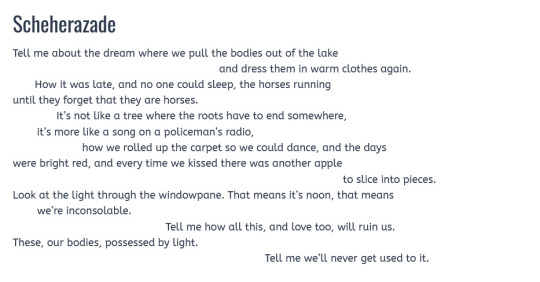
Rene Descartes and the Clock Work Girl - Kathryn Nuernberger | Scheherazade - Richard Siken
("Rene Descartes and the Clock Work Girl" is longer than what's in the picture; read the full poem at the link above.)
4 notes
·
View notes
Text
Things heard in my philosophy a-level class:
"I've slammed Descartes like three times in this essay already..."
"I always imagine Hume coming in on a skateboard, wearing sunglasses."
"I was explaining intuition and deduction thesis to my mum and now she hates Descartes."
"I actually liked Aristotle until he said that only white, male philosophers can flourish."
"... the evil demon, a.k.a. Mr. Phillippou, ..." [an ex-philosophy teacher of our school]
The teacher: "left-handed people are superior. I tried to force my kids to be left-handed when they were learning to write..."
"Descartes pisses me the fuck off."
"... G. E. Moore, a.k.a. G. E. Awful, ..."
"I love error theory. It just says that everyone is wrong all the time."
"What's that guy in the Gettier example with the barns called?" "Barney." "No, no, it's Henry." "Wait, Henry? I thought it was Harry!"
"I always remember that name because my great aunt named her pet rabbit 'Carruthers'."
"But the concept of infinity doesn't make sense!" "Well, according to Georg Cantor's set theory, it does." "What even is set theory, then?" "Don't even go there. You don't need to know, so just don't ask."
"Onto and Teleo are okay, but I just can't with Cosmo. Don't even get me started on Aquinas' ways..."
"Eschatological verification is the dumbest thing I've ever heard. No offence to Hick or anything..."
"Do you think Richard Hare's friends ever called him 'Dick Hair'?"
"I don't understand how some people can even doubt qualia..."
"P-zombies freak me out."
"So you'd be willing to concede that if everyone in China had walkie-talkies, they'd be considered a mind?" "... I mean, yeah. Why not?" "You're not supposed to say yes!"
#philosophy#descartes#hume#aristotle#the evil demon#left handed#essays#school#classes#a levels#g. e. moore#carruthers#pets#pet rabbit#error theory#georg cantor#set theory#gettier#ontological#teleological#cosmological#thomas aquinas#eschatological verification#john hick#richard hare#qualia#philosophical zombie#china#walkie talkie#minds
8 notes
·
View notes
Text
names, mostly surnames (1)
let me apologise for this partial list of names in the library, titles available on request...
, Adorno, horkheimer, anderson, aristotle, greta adorno, marcuse, agamben, acampora and acampora, althussar, lajac kovacic, eric alliez, marc auge, attali, francis bacon (16th c), aries, aries and bejin, alain badiou, beckett, hallward, barnes, bachelard, bahktin, volshinov, baudrillard, barthes, john beattie, medvedev, henri bergson, Jacques Bidet, berkman, zybmunt bauman, burgin, baugh, sam butler, ulrich beck, andrew benjamin and peter osbourne, walter benjamin, ernest bloch, blanchot, bruzins, bonnet, karin bojs, bourdieu, j.d. bernal, goldsmith, benveniste, braidotti, brecht, burch, victor serge, andre breton, judith butler, malcolm bull, stanley cohen, john berger, etienne balibar, david bohm, gans blumenberg, martin buber, christopher caudwell, micel callon, albert camus, agnes callard, castoridis, claudio celis bueno, carchedi and roberts, Marisol de la cadena, mario blaser, nancy cartwright, manual castells, mark currie, collingwood, canguilhem, mario corti, stuart hall, andrew lowe, paul willis, coyne, stefan collini, varbara cassin, helene cixous, coward and ellis, clastres, carr, cioren, irving copi, cassirer, carter and willians, margeret cohen, Francoise dastur, guy debord, agnes martin, michele bernstein, alice, lorraine dastun, debaise, Gilles Deleuze, deleuze and gattari, guattari, parnet, iain mackenzie, bignall, stivale, holland, smith, james williams, zourabichvili, paul patton, kerslake, schuster, bogue, bryant, anne sauvagnargues, hanjo berresen, frida beckman, johnson, gulliarme and hughes, valentine moulard-leonard, desai, dosse, duttman, d’amico, benoit peters, derrida, hinca zarifopol-johnston, sean gaston, discourse, mark poster, foucault, steve fuller, markus gabrial, rosenbergm milchamn, colin jones, van fraasen, fekete, vilem flusser, flahault, heri focillon, rudi visker, ernst fischer, fink, faye, fuller, fiho, marco bollo, hans magnus enxensberger, leen de bolle, canetti, ilya enrenberg, thuan, sebastion peake, mervyn peake, robert henderson, reimann, roth, bae suah, yabouza, marco bellatin, cartarescu, nick harkaway, chris norris, deLanda, regis debray, pattern and doniger, soame jynens, bernard williams, descartes, anne dufourmanteille, michelle le doeuff, de certaeu , deligny, Georges Dumezil, dumenil and levy, bernard edelman, victorverlich, berio, arendt, amy allen, de beauvior,hiroka azumi, bedau and humphreys, beuad, georges bataille, caspar henderson, chris innes, yevgeny zamyatin, louis aragon, italo calvino, pierre guirard, trustan garcia, rene girard, paul gilroy, michal gardner, andre gorz, jurgan gabermas, martin gagglund, beatrice hannssen, jean hyppolyte, axel honneth, zizek and crickett, stephen heath, calentin groebner, j.b.s. haldane, ian hacking, david hakken, hallward and oekken, haug, harman, latour, arnold hauser, hegel, pippin, pinksrd, michel henry, louis hjelmslev, gilbert hardin, alice jardine, karl jaspers, suzzane kirkbright, david hume, thomas hobbes, barry hindus, paul hirst, hindess and hirst, wrrner hamacher, bertrand gille, julien huxley, halavais, irigaray, ted honderich, julia kristeva, leibnitz, d lecourt, lazzaroto, kluge and negt, alexander kluge, sarah kofman, alexandre kojeve, kolozoya, keynes, richard kangston, ben lehman, kant, francous jullien, fred hameson, sntonio rabucchi, jaeggi, steve lanierjones, tim jackson, jakobson, joeseph needham, arne de boever, marx and engels, karl marx, frederick engels, heinrich, McLellen , maturana and varuna, lem, lordon, jean jacques-lecercle, malabou, marazzi, heiner muller, mary midgley, armand matterlart, ariel dorfman, matakovsky, nacneice, lucid, victor margolis, narco lippi, glen mazis, nair, william morris, nabis, jean luc nancy, geoffrey nash, antonio negri, negri and hardt, hardt, keith ansell pearson, pettman, william ruddiman, rheinberger, andre orlean, v.i. vernadsky, rodchenko, john willet, tarkovsky, william empson, michel serres, virillio, semiotexte, helmut heiseenbuttel, plessner, pechaux, raunig, retort, saito, serres, dolphin, maria assad, spinoza, bernard sharratt, isabelle stengers, viktor shklovsky, t. todorov, enzo traverso, mario tronti, todes, ivan pavlov, whitehead, frank trentmann, trubetzkoy, rodowink, widderman, karl wittfogel, peter handke, olivier rolin, pavese, robert walser, petr kral, von arnim, sir john mennis, ladies cabinet, samuel johnson, edmund spenser, efy poppy, yoko ogawa, machado, kaurence durrell, brigid brophy, a. betram chandler, maria gabriella llansol, fowler, ransmayr, novick, llewellyn, brennan, sean carroll, julien rios, pintor, wraxall, jaccottet, tabucchi, iain banks, glasstone, clarice lispector, murakami, ludmilla petrushevskaya, motoya, bachmann, lindqvist, uwe johnson, einear macbride, szentkuthy, vladislavic, nanguel, mathias enard, chris tomas, jonathan meades, armo schmidt, charles yu, micheal sorkin, vilas- matas, varesi, peter weiss, stephenson, paul legrande, virginie despentes, pessoa, brin, furst, gunter trass, umberto eco, reid, paul,klee, mario levero, hearn, judith schalansky, moorhead, margert walters, rodchenko and popova, david king, alisdair gray, burroughs, ben fine, paul hirst, hindess, kapuscinski, tchaikovsky, brooke-rose, david hoon kim, helms, mahfouz, ardret, felipe fernandez-armesto, young and tagomon, aronson, bonneuil and fressoz, h.s. bennett, amy allen, bruckner brown, honegger, bernhard, warren miller, albert thelen, margoy bennett, rose macauley, nenjamin peret, sax rohmer, angeliki, bostrom, phillip ball, the invisible commitee, bataille and leiris, gregory bateson, michelle barrett and mary mcintosh, bardini, bugin, mcdonald, kaplan, buck-moores, chesterman and lipman, berman, cicero, chanan, chatelet, helene cixous, iain cha,bers, smirgel, norman clark, caird, camus, clayre, chomsky, critchley, curry, swingewood, luigi luca cavelli-sforza, clark, esposito, doerner, de duve, alexander dovzhenko, donzelot, dennet, doyle, burkheim, de camp, darwin, dawkins, didi-huberman, dundar, george dyson, berard deleuze, evo, barbara ehrenrich, edwards, e isenstein, ebeking, economy and society, esposito, frederick gross, david edgeerton, douglas, paul,feyerband, jerry fodor, gorrdiener, tom forester, korsgaard, fink, floridi, elizabeth groscz, pierre francastel, jane jacobs, francois laplantinee, gould, galloway, goux, godel, grouys, genette, gil, kahloo, giddens, martin gardner, gilbert and dubar, hobbes, herve, golinski, grotowski, glieck, hayles, heidegger, huxley, eric hobsbawn, jean-louis hippolyte, phillip hoare, tim jordan, david harvey, hawking, hoggart, rosemary jackson, myerson, mary jacobus, fox keller, illich, sarah fofman, sylvia harvey, john holloway, han, jaspers, yuk hui, pierre hadot, carl gardner, william james, bell hooks, edmond jabes, kierkegaard, alexander keen, kropotkin, tracy kidder, mithen, kothari and mehta, lind, c. joad, bart kosko, kathy myers, kaplan, luce irigaraay, patrick ke iller, kittler, catherine belsey, kmar, klossowski, holmes, kant, stanton, ernesto laclau, jenkins, la mouffe, walter john williams, adam greenfield, susan greenfield, paul auster, viet nguyen, jeremy nicholson, andy weir, fred jameson, lacoue-labarthe, bede, jane gallop, lacan, wilden, willy ley, henri lefebvre, rob sheilds, sandra laugier, micheal lowy, barry levinson, sylvain lazurus, lousardo, leopardo, jean-francois lyotard, jones, lewontin, steve levy, alice in genderland, laing, lanier, lakatos, laurelle, luxemburg, lukacs, jarsh, james lovelock, ideologu and consciousness, economy and society, screen, deleuze studies, deleuze and guattari studies, bruno latour, david lapoujade, stephen law, primo levi, levi-strauss, emmanuel levinas, viktor schonberger, pierre levy, gustav landaur, robin le poidevin, les levidow, lautman, david cooper, serge leclaire, catherine malabou, karl kautsky, alice meynall, j.s. mill, montainge, elaine miller, rosa levine-meyer, jean luc marion, henri lefebrve, lipovetsky, terry lovell, niklas luhmann, richard may, machiavelli, richard mabey, john mullzrkey, meyerhold, edward braun, magri, murray, nathanial lichfield, noelle mcafee, hans meyer, ouspensky, lucretius, asa briggs, william morris, christian metz, laura mulvey, len masterman, karl mannheim, louis marin, alaister reynolds, antonio munoz molina, FRAZER, arno schmidt, dinae waldman, mark rothko, cornwall, micheal snow, sophie henaff, scarlett thomas, matuszewski, lillya brik, rosamond lehman , morris and o’conner, nina bawden, cora sandel, delafield, storm jameson, lovi , rachel ferguson, stevie smith, pat barker, miles franklin, fay weldon, crista wolff, grace paley, v. woolf, naomi mitchinson, sheila rowbotham, e, somerville and v ross, sander marai, jose saramago, strugatsky, jean echenoz, mark robso, vladimir Vernadsky, chris marker, Kim Stanley Robinson, mario leverdo, r.a. lafferty, martin bax, mcaulay, tatyana tolstaya, colinn kapp, jonathan meades, franco fortini, sam delany, philip e high, h.g. adler, feng menglong, adam thorpe, peeter nadas, sam butler, narnold silver, deren, joanna moorhead, leonara carrington, de waal, hartt, botticelli, charbonneau, casco pratolini, murakami, aldiss, guidomorselli, ludmilla petrushevskaya, ,schulz, de andrade, yasushi. inoue, renoir, amelie nothomb, ken liu, prynne, ANTIONE VOLODINE, luc brasso, angela greene, dorothea tanning, eric chevillard, margot bennett w.e. johns, conan doyle, samuel johnson, herge, coutine-denamy, sterling, roubaud, sloan, meiville, delarivier manley, andre norton, perec, edward upward, tom mcCarthy, magrinya, stross, eco, godden, malcolm lowry, derekmiller, ismail kadare, scott lynch, chris fowler, perter newman, suzzana clarke, paretky, juliscz balicki, stanislaw maykowski, rajaniemi, william morris, c.k. crow, ueys, oldenburg, mssrc chwmot, will pryce, munroe, brnabas and kindersley, tromans, lem, zelazny, mitchinson, harry Harrison, konstantin tsiolkovsky, flammerion, harrison, arthur c clarke, carpenter, john brunner, anhony powell, ted white, sheckley, kristof, kempowski, shingo, angelica groodischer, rolin, galeanom dobin, richard holloway, pohl and kornbulth, e.r. eddison, ken macleodm aldiss, dave hutchinson, alfred bester, budrys, pynchon, kurkov, wisniewski_snerg, , kenji miyazawa, dante, laidlaw, paek nam_nyong, maspero, colohouquon, hernandez, christina hesselholdt, claude simon, bulgaakov, simak, verissimo, sorokin, sarraute, prevert, celan, bachmann, mervin peake, olaf stapledon, sa rohmer, robert musil, le clezio, jeremy cooper, zambra, giorgio de chirico, mjax frisch, gawron, daumal, tomzza, canetti, framcois maspero, de quincy, defoe, green,, greene, marani, bellatin, khury, tapinar,, richmal crompton, durrenmat, fritz, quintane, volponi, nanni balestrini, herrera, robert walser, duras, peter stamm, m foster, lan wright, their theotokism agustn de rojas, paul eluard, sturgeon, hiromi kawakomi, sayaka murata, wolfgang hilbig, hmilton, z zivkovic, gersson, mallo, bird, chaudrey, Toussaint, Can Xue, Lewis Mumford, neitzsche, popper, zizek, scott westerfield, rousseau, lewis munford, tod may, penelope maddy, elaine marks, isabelle courtivron, leroi, massumi, david sterritt, godard, millican and clark, macabe, negri, mauss, maiimon, patrica maccormack, moretti, courtney humphries, monad, moyn, malina, picasso, goldman, dambisa moyo, merleau-ponty, Nicholson, knobe and nichols, poinciore, morris, ovid, ming, nail, thomas more, richard mabey, macfarlane, piscator, louis-stempal, negrastini, moore, jacquline rose, rose and rose, ryle, roszick, rosenburg, ravisson, paul ricoer, rossler, chantl mouffe, david reiff, plato, slater, rowlands, rosa, john roberts, rhan, dubios and rousseau, ronell, jacques ranciere, mallarme, quinodoz, peterpelbert, mary poovey, mackenzie, andrew price, opopper, roger penrose, lu cino parisi, gavin rae, parker and pollack, mirowoski, perniola, postman, panofsky, propp, paschke and rodel, andre pickering, massabuau, lars svenddsen, rosenberg and whyte, t.l.s. sprigger, nancy armstrong, sallis, dale spender, stanislavski, vanessa schwartz, shapin and shaeffer, sally sedgewick, signs, gabriel tarde, charles singer, adam smith, simondon, pascal chablt, combes, jon roffee, edward said, sen, nik farrell fox, sartre, fred emery, scholes, herbert spencer, ruth saw, spinoza, raphael sassower, henry sidgewick, peter singer, katarznya de lazari-radek, piaget, podach, van der post, on fire, one press, melossi and pavarini, pearl and mackenzie, theirry paquot, tanizaki, RHS, stone, richard sennett, graham priest, osborn and pagnell, substance, pedrag cicovacki, schilthuizen, susan sontag, gillian rose, nikolas rose, g rattery taylor, rose, rajan, stuart sim, max raphael, media culture and society, heller- roazen, rid, root, rossi, gramsci, showstack sasson, david roden, adrew ross, rosenvallion, pauliina remes, pkato, peter sloterdijk, tamsin shaw, george simmel, bullock and trombley, mark francis, alain supiot, suvin, mullen and suvin, stroma, maimonides, van vogt, the clouds on unknowing, enclotic, thesis 11, spivack, kate raworth, h.w. richardson, hillial schwartz, stern, rebecca solnit, rowland parker, pickering, lukacs, epicriud, epicetus, lucrtious, aurelies, w.j.oates, thor Hanson, thompson, mabey, sheldrake, eatherley, plato, jeffries, dorothy richardson, arno schmidt, earl derr biggersm mary borden, birrel, arno schmidt, o.a. henty, berhard steigler, victor serge, smith, joyce salisbury, pauer-studer, timpanaro, s helling, schlor, norman and welchman, searle, emanuele severarimo, tomasello, sklar, judith singer, walmisley, thomas malthus, quentin meilassoux, alberto meelucchi, mingione, rurnbull, said, spufford and uglow, zone, j.j.c. smartt, sandel, skater, songe-moller, strawson, strawson, strawson, raymond tallis, toscano, turkle, tiqquin, diggins, j.s. ogilivy, w.w. hutchings, rackgam, deiter roth, dowell, red notes, campbell and pryce,osip brik, lilya brik, mayakovsky, zone, alvin toffker, st exupery, freya stark, warson, walsh, wooley, tiles and oberdick, timofeeva, richardson, marcuse, marder, wright, ushenko, tolson, albebers and moholy- nagy, alyce mahon, gablik, burnett, barry, hill, fontaine, sanuel johnson,justin, block, taylor, peter handke, jacques rivette, william sansom, bunuel and dali, tom bullough, aldius huxley, philip robinson, spendor, tzara, wajcman, peter wohlleben, prigogini, paolo virno, jeremy tunstall, theweliet, taussig, tricker, vince, thomss, williams, vogl, new german critique, e.p. thompson, jean wahl, paul virilio, lotringer, christy wampole, verhaeghe, janet wolff, anna kavan, vergara, uexkull, couze venn, barry smart, vico, vatimo, vernant, raoul vaneigem, ibn warraq, vertov, williams, meiksins wood, norbert weiner, peter wollen, h.g. wells, michelle walker, , jeanne waelit walters, shaw and darlen, whorf, ward and dubois, john wright, weinart, wolff, willis, wark, cosima wagner, j. weeks, judith williamson, welzbacher, erik olin wright, wittgenstein, kenny, zeldin, wenders, henry miller, wenkler, arrighi, banks, innes, ushereood, kristeva, john cage, quignard, t.f. powys, siri hustveldt, lem, zelazny, mitchonson, tsilolkovsky, toussaint, heppenstall, garrigasait, de kerangal, haine fenn, jean bloch, geoff ryman, reve, corey, asemkulov, ernaux, gareth powell, cory, deleuze and guattari studies, cse, allain and souvestre, apolinaire, jane austen, john arden, aitmatov, elizabth von arnim, paul auster, abish, ackroyd, tom gunn, lorca, akhmatov, artuad, simon armatige, albahari, felipe alfau, audem auden and soendor, varicco, barrico, bainbridge, asturias, ronan bennett, beckett, paul bowles, jane bowles, celine, bukowski, wu ming, blissert, kay boyle, andrei bely, hugo barnacle, BOLL, isak dineson, karen blikson, brodsky, richmel crompton, berry, barthleme, mary butts, leonora carrington, cage, chevhillard, canetti, cendres, butor, cortazar, danielewski, bertha damon, dyer, havier cercas, micheal dibden, marguerite duras, john donne, duras, durrell, dorrie, Fredric durrenmatt, heppenstahl, eco, enzensberger, evanovich, fruentes, farrell, alison fell, alisdair gray, hollinhurst, andre gide, jean giono, gadda, henry green, grass, andre gorz, william gibson, joyce, gombrowitz, alex laishley, murakami, herve guibert, franz kafka, juenger, junker, kapuscinski, laurie king, kundera, mcewan, ken macleod, ian macdonald, moers, meades, vonda macintyre, nalmstom, maillert, havier marias, jeff noon, anaus nin, david nobbs, peter nadas, nabokov, iakley, oates, raymond queneau, cesare pavese, paterson, ponge, perte, perec, chinery, ovid, genette, kandinsky, robert pinget, richard piwers, rouvaud, sloan, surrralist poetry, ilya troyanov, paul,raabe, julien rios, arne dahl, pierre sollers, rodrigruez, chris ross, renate rasp, ruiz, rulfo, tove jannsson, cabre, vladislavic, tokarczuk, pessoa, jane bowles, calvino, lispector, lydia davis, can xue, sebald, peter tripp, hertzberg, virginia woolf, zozola, sorrentino, higgins, v.w. straka, cogman, freud, jung, klein, winnecot, lacan, fordham, samuels, jung, freud, appignesai, bjp, pullman, magnam, sybil marshall, mccarten, galbraith, jewell, lehmann, levy, levin, jung, spinoza, fairburn, jung, sandler, lacan, laplanche, pontalis, can, xue, klein, cavelli, hawkins, stevens, hanna segal, bollas, welldon, williams, sutherland, buon, symington, morrison, brittain, sidoli, sidoli, holmes, bowlby, winnecott, bollas, kalschiid, malan, patrick casement, anna frued, wittenburg, liz wright, fordham, fairburn, symington, sandler, jung, balint, coltart, west, steiner, van der post, stern, green, roustang, adrew samuels, d.l. sayers, salom, krassner, swain, rame and fo, storr, cogman, hessen, penelope fitzgerald, cummings, richard holloway, juhea kim, glenville, heyer, cartland, kim, cho, atkinson, james, king, audten, hartley, du maurier, bronte, thomas, plath, leon, camillairi, kaussar, fred fargas, boyd, sjowall and wahloo, pheby, morenno-garcia, perrsson, herron, nicola barker, arronovitch, karen lord, stephen frosh, ernest jones, flamm o’brien, shin, mishra, chin jin-young and so on to the warm horizon
7 notes
·
View notes
Text
THE 236 GREATEST PERSONALITIES IN THE ENTIRE KNOWN HISTORY/COLLECTIVE CONSCIOUSNESS OF THIS WORLD! (@INDIES)
i.e. THE 236 GREATEST PERSONALITIES IN WORLD HISTORY! (@INDIES)
Rajesh Khanna
Lionel Messi
Leonardo Da Vinci
Muhammad Ali
Joan of Arc
William Shakespeare
Vincent Van Gogh
Online Indie
J. K. Rowling
David Lean
Nadia Comaneci
Diego Maradona
Wolfgang Amadeus Mozart
Meena Kumari
Julius Caesar
Harrison Ford
Ludwig Van Beethoven
William W. Cargill
Fritz Hoffmann-La Roche
Samuel Curtis Johnson
Sam Walton
John D. Rockefeller
Andrew Carnegie
Roy Thomson
Tim Berners-Lee
Marie Curie
James J. Hill
Cornelius Vanderbilt
Roman Polanski
Samuel Slater
J. P. Morgan
Cary Grant
Dmitri Mendeleev
John Harvard
Alain Delon
Ramakrishna Paramhansa (Official God)
The Lumiere Brothers, Auguste & Louis
Carl Friedrich Benz
Michelangelo
Maharishi Mahesh Yogi
Ramana Maharishi
Mark Twain
Swami Sri Yukteswar Giri
Bruce Lee
Bhagwan Krishna (Official God)
Charlemagne
Rene Descartes
John F. Kennedy
Bhagwan Ganesha (Official God)
Walt Disney
Albert Einstein
Nikola Tesla
Alfred Hitchcock
Pythagoras
William Randolph Hearst
Cosimo de’ Medici
Johann Sebastian Bach
Alec Guinness
Nostradamus
Christopher Plummer
Archimedes
Jackie Chan
Guru Dutt
Amma Karunamayi/ Mata Parvati (Official God)
Peter Sellers
Gerard Depardieu
Joseph Safra
Robert Morris
Sean Connery
Petr Kellner
Aristotle Onassis
Usain Bolt
Jack Welch
Alfredo di Stefano
Elizabeth Taylor
Michael Jordan
Paul Muni
Steven Spielberg
Louis Pasteur
Ingrid Bergman
Norma Shearer
Dr. B. R. Ambedkar
Ayn Rand
Jesus Christ (Official God)
Luciano Pavarotti
Alain Resnais
Frank Sinatra
Allah (Official God)
Richard Nixon
Charlie Chaplin
Thomas Alva Edison
Alexander Graham Bell
Wright Brothers
Arjun (of Bhagwan Krishna’s Gita)
Jim Simons
George Lucas
Swami Sri Lahiri Mahasaya
Carl Lewis
Brett Favre
Helen Keller
Bernard Mannes Baruch
Buddha (Official God)
Hugh Grant
K. L. Saigal
Roger Federer
Rash Behari Bose
Tiger Woods
William Blake
Jesse Owens
Claude Miller
Bernardo Bertolucci
Subhash Chandra Bose
Satyajit Ray
Hippocrates
Chiang Kai-Shek
John Logie Baird
Geeta Dutt
Raphael (painter)
Bhagwan Shiva (Official God)
Radha (Ancient Krishna devotee)
George Orwell
Jorge Paulo Lemann
Catherine Deneuve
Pierre-Auguste Renoir
Bill Gates
Bhagwan Ram (Official God)
Michael Phelps
Michael Faraday
Audrey Hepburn
Dalai Lama
Grace Kelly
Mikhail Gorbachev
Vladimir Putin
Galileo Galilei
Gary Cooper
Roger Moore
John Huston
Blaise Pascal
Humphrey Bogart
Rudyard Kipling
Samuel Morse
Wayne Gretzky
Yogi Berra
Barry Levinson
Patrice Chereau (director)
Jerry Lewis
Louis Daguerre
James Watt
Henri Rousseau
Nikita Krushchev
Jack Dorsey
Dev Anand
Elia Kazan
Alexander Fleming
David Selznick
Frank Marshall
Viswanathan Anand
Major Dhyan Chand
Swami Vivekananda
Felix Rohatyn
Sam Spiegel
Anand Bakshi
Victor Hugo
Bhagwan Sri Sathya Sai Baba (Official God)
Steve Jobs
Srinivasa Ramanujam
Lord Hanuman
Stanley Kubrick
Giotto
Voltaire
Diego Velazquez
Ernest Hemingway
Francis Ford Coppola
Michael Douglas
Kirk Douglas
Mario Lemieux
Kishore Kumar
James Stewart
Douglas Fairbanks
Confucius
Babe Ruth
Raj Kapoor
Titian aka Tiziano Vecelli
El Greco
Francisco de Goya
Jim Carrey
Mohammad Rafi
Steffi Graf
Pele
Gustave Courbet
Rani Laxmibai of Jhansi
Milos Forman
Steve Wozniak
Georgia O’ Keeffe
Mala Sinha
Aryabhatta
Magic Johnson
Patanjali
Leo Tolstoy
Tansen
Henry Fonda
Albrecht Durer
Benazir Bhutto
Cal Ripken Jr
Samuel Goldwyn
Mumtaz (actress)
Panini
Nicolaus Copernicus
Pablo Picasso
George Clooney
Olivia de Havilland
Prem Chand
Imran Khan
Pete Sampras
Ratan Tata
Meerabai (16th c. Krishna devotee)
Queen Elizabeth II
Pope John Paul II
James Cameron
Jack Ma
Warren Buffett
Romy Schneider
C. V. Raman
Aung San Suu Kyi
Benjamin Netanyahu
Frank Capra
Michael Schumacher
Steve Forbes
Paramhansa Yogananda
Tom Hanks
Kamal Amrohi
Hans Holbein
Shammi Kapoor
Gerardus Mercator
Edith Piaf
Bhagwan Shirdi Sai Baba (Official God)
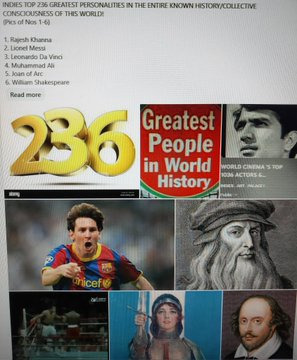


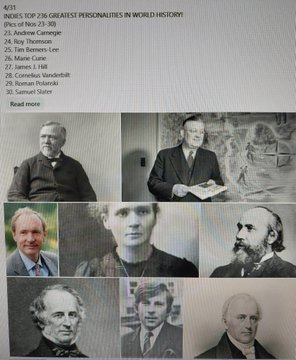
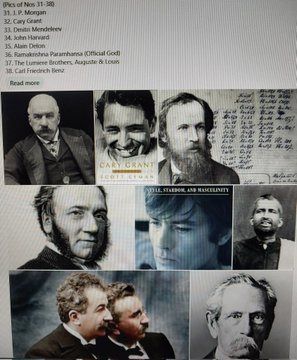
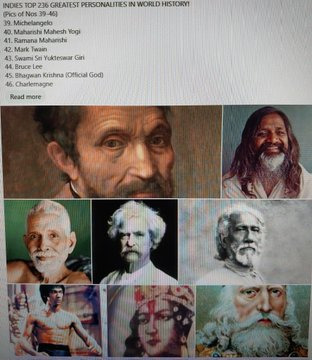
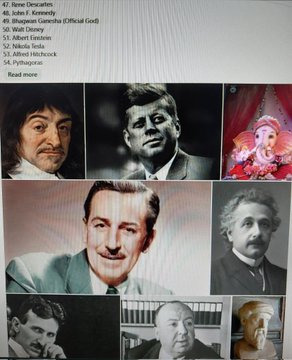
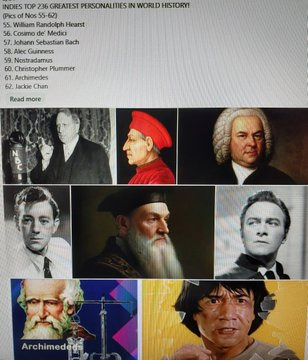
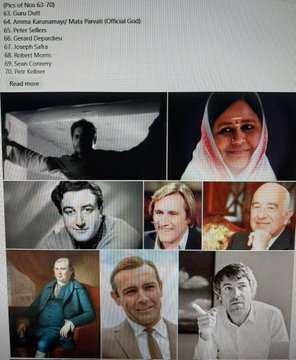
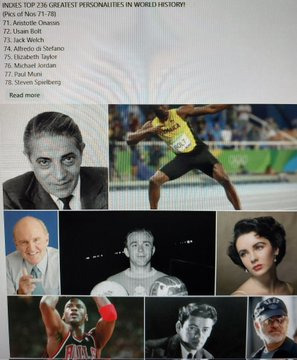
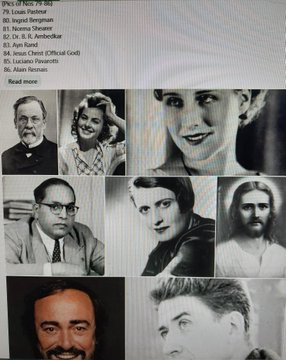
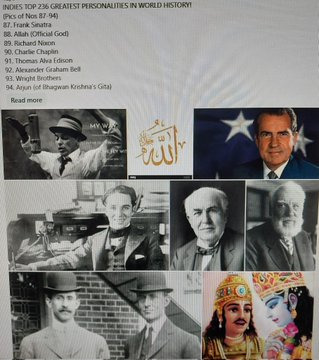
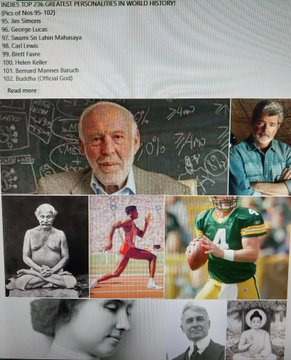
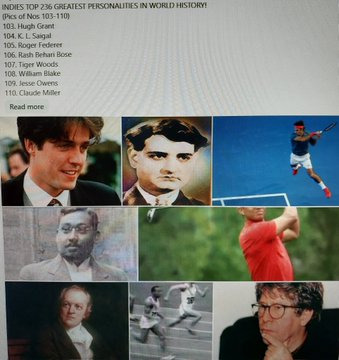
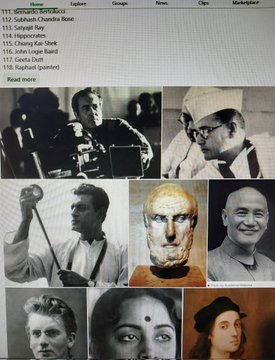
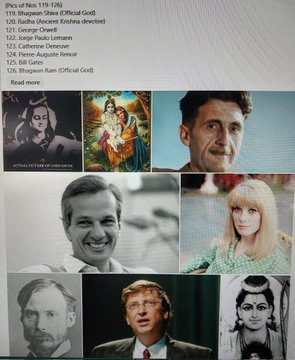
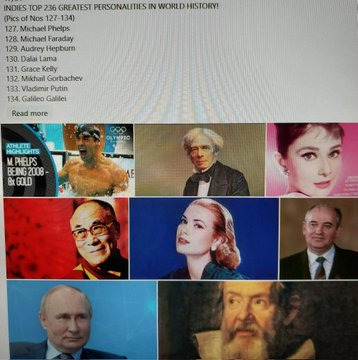
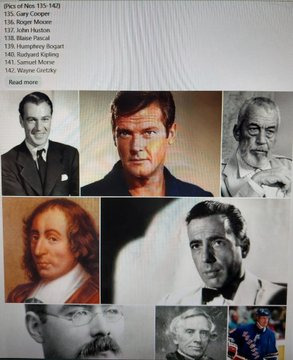
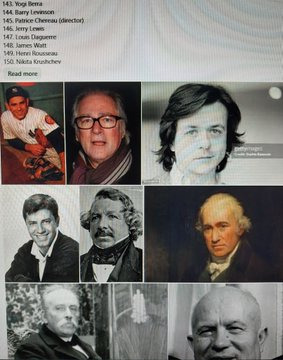
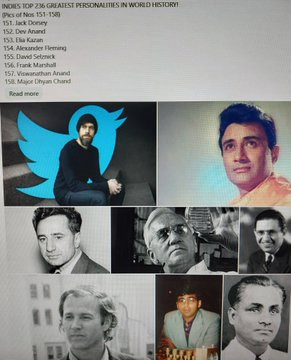
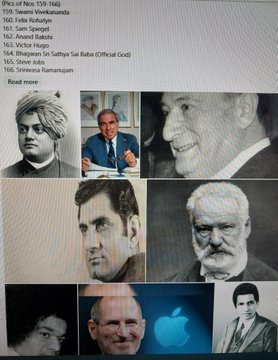
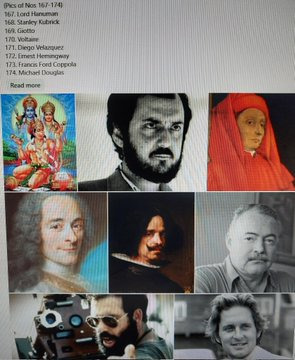
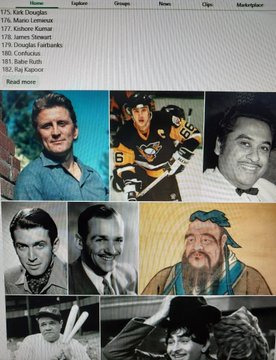
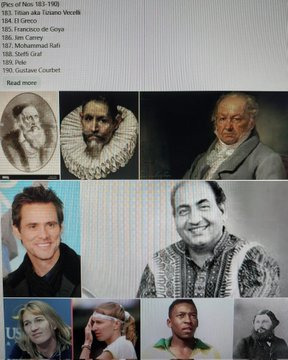
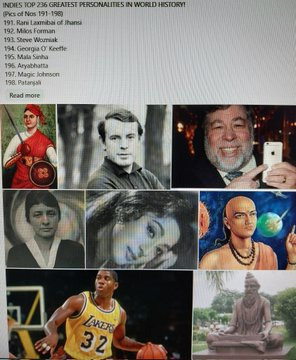
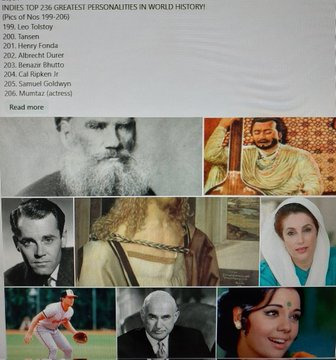

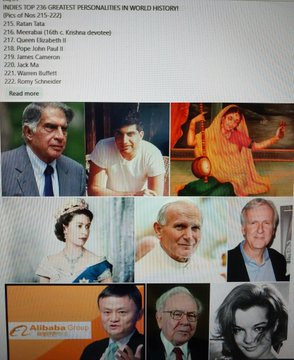
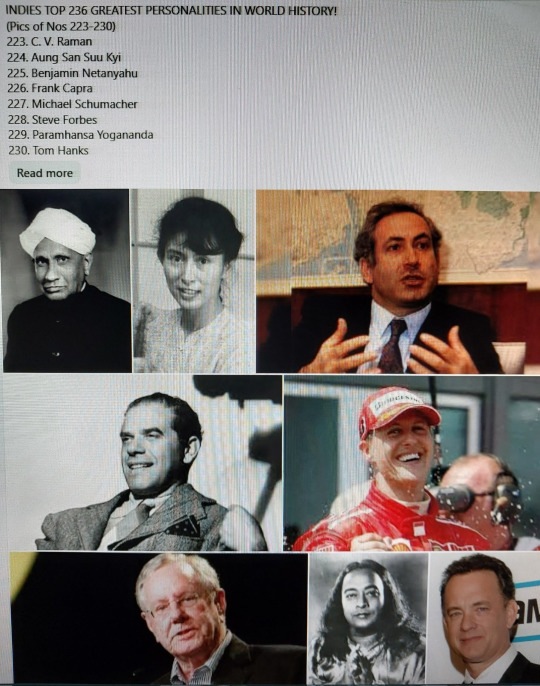
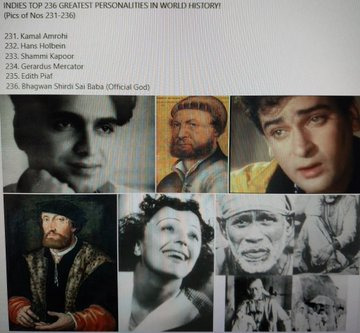
3 notes
·
View notes
Note
HIIII i love having the niche history mutuals on tumblr dot com because um. quiz coming up tomorrow on the scientific revolution - if you (tumblr user ted williamharvey) had to tell me why william harvey (guy) was significant - beyond “he discovered the circulatory system” what would you say……. this is so silly you don’t have to answer i just. the opportunity to connect is there <3
!! ok so he:
introduced experimental medicine & helped create the field of physiology
led to the idea that illnesses could be caused by things going on within the circulatory system such as blood pressure and artery obstruction
also allowed for things like richard lower's work on blood transfusion
and of course his findings caused more advancements in the circulation theory (bc yknow he wasn't entirely right). for example rené descartes' thoughts on the circulatory system were directly built off of his
#ask#william harvey#i enjoyed this ask thank you ^_^ i haven't gotten one about a specific aspect of a historical figure in a while
5 notes
·
View notes
Text
Birthdays 3.31
Beer Birthdays
Frank Hahne (1856)
David Buhler (1959)
Five Favorite Birthdays
William Daniels; actor (1927)
Nikolai Gogol; Russian writer (1809)
Shirley Jones; actor (1934)
Ewan McGregor; actor (1971)
Christopher Walken; actor (1943)
Famous Birthdays
Herb Alpert; bandleader (1935)
Johann Sebastian Bach; composer (1685)
Robert Bunsen; German chemist (1811)
Leo Buscaglia; writer (1925)
Richard Chamberlain; actor (1934)
Cesar Chavez; labor leader (1927)
Liz Clairborne; fashion designer (1929)
Tony Cox; actor (1958)
René Descartes; French philosopher (1596)
Edward Fitzgerald; writer (1809)
John Fowles; English writer (1926)
Barney Frank; politician (1940)
Arthur Godfrey; television host (1903)
Al Gore; politician, US Vice-President (1948)
Franz Haydn; composer (1732)
Gordie Howe; Detroit Red Wings RW (1928)
John Jakes; writer (1932)
Jack Johnson; boxer (1878)
Gabe Kaplan; actor, comedian (1945)
Andrew Lang; Scottish writer (1844)
Ed Marinaro; actor, Minnesota Vikings RB (1950)
Marc McClure; actor (1957)
Paul Mercurio; Australian actor, dancer (1963)
Ashton Moore; porn actor (1976)
Henry Morgan; actor (1915)
Al Nichol; rock musician (1946)
Red Norvo; jazz vibraphonist (1908)
Octavio Paz; Mexican writer (1914)
Rhea Perlman; actor (1948)
Judith Rossner; writer (1935)
Angus Young; rock guitarist (1955)
1 note
·
View note
Text
DURUM:
SORU : Tavuk karşıdan karşıya niçin geçer?
YANITLAR: 😊😊
René Descartes: Yolun öbür tarafına geçmek için.
Eflatun: Kendi iyiliği için. Çünkü gerçek, öteki taraftadır.
Aristoteles: Karşıdan karşıya geçmek tavuğun doğasında vardır.
Karl Marx: Çünkü bu tarihsel olarak kaçınılmazdı.
Hipokrat: Pankreasının aşırı salgısı nedeniyle.
Martin Luther: Tüm tavukların sebebini açıklamak zorunda kalmadan özgürce karşıdan karşıya geçebildikleri bir dünya düşlüyorum.
Richard Nixon: Tavuk karşıdan karşıya geçmedi. Tekrar ediyorum, tavuk asla yolun karşısına geçmedi.
Sigmund Freud: Tavuğun karşıdan karşıya geçmesiyle ilgileniyor oluşunuz, sizdeki güçlü cinsel güvensizlik duygusunu açığa çıkarmaktadır.
Buda: Bu soruyu sorarak, kendi tavuk doğanızı inkar ediyorsunuz.
Galileo Galilei: Halbuki tavuk karşıdan karşıya geçiyor.
Charles de Gaulle: Evet tavuk belki yolun karşısına geçti, ama henüz otoyolun karşısına geçmedi.
Albert Einstein: Belki tavuk karşıdan karşıya geçmemiştir de yol tavuğun altından geçmiştir. Bu grecelidir ve neyi referans aldığınızla ilgilidir.
George W. Bush: BM kararlarına rağmen tavuğun bu yolda karşıdan karşıya geçmesi, demokrasiye, özgürlüğe kafa tutmaktır. Yolu bombalayıp tavuğu havaya uçurmann vakti gelmiş de geçiyordur bile.
Nihat Doğan: Benim ülkemin tavuğunun yürüyüşü bile farklı.
Necati Şaşmaz: Buffşınya bufşınya, bruvvm!
ben kurşunlar arasından uçarak geçerim ve ölmem.
Süleyman Demirel: Tavuk geçmişse geçmiş, geçmemişse geçmemiştir.
Tansu Çiller: Bu memleket uğrunda karşıdan karşıya geçen tavuk da bizimdir, tavuğun üstünden geçen traktör de bizimdir.
Bülent Arınç: Tavuğun karşıdan karşıya geçmesi çok manidardır.
Recep Tayyip Erdoğan: Karşıdan karşıya geçmesini tavuktan öğrenecek değiliz.
Ahmet Davutoğlu : Karşıdan karşıya geçen bu tavuğu şiddetle kınıyorum. Kimse asfaltımızın gücünü test etmeye kalkmasın!
Fethullah Gülen: Allah o tavuğun kümesine ateşler salsın.
Abdullah Gül: Bana böyle bir bilgi verilmedi ama karşıdan karşıya geçtiyse hükümet gereğini yapar.
Kemal Kılıçdaroğlu: Bu tavuğun böyle rahat davranmasına izin verenler bunun hesabını verecek. Bu işin peşini bırakmayacağız. Gerekirse Anayasa mahkemesine gideriz. Hodri meydan!
İ. Melih Gökçek: Biz yol yapmasaydık, tavuk nah karşıya geçerdi.
Cübbeli Ahmet Hoca: Bırak şimdi tavuğu yahu! Sen sırattan karşıya geçebilecek misin onu düşün!
Nihat Hatipoğlu: Arabalar tüm hızıyla geliyordu. Tavuk karşıya geçmeye çalışıyordu. Kornalar susmak bilmiyordu. Tavuk karşıya geçmek için her hamle yaptığında arabalardan ürküp geri kaçıyordu. Yeteeeer diyordu yeteeerrr!
Alıntı
0 notes
Text


Elizabeth Haldane, the Scottish social reformer and writer died on 24th December 1937 at St. Margaret’s Hospital, Auchterarder, Perthshire.
Miss Haldane was born into a notable family, her relatives including Robert and James Haldane, the noted evangelists, and her brothers, physiologist, John Scott Haldane, and politician, Richard Burdon Haldane, Viscount Haldane of Cloan. After working in the Royal Infirmary of Edinburgh she served on various regulatory and advisory boards related to nursing.
Haldane was also keenly interested in the improvement of housing conditions, founding an organisation to redevelop some of Edinburgh’s worst slums. She was a noted author and translator, writing a Life of Descartes and editing his philosophical works. She translated Hegel, and wrote on both George Eliot and Mrs Gaskell. In 1920, Haldane was appointed the first female Justice of the Peace in Scotland.
There’s very little else about her online, but many of her books are still available for sale, always the sign of a good writer.
14 notes
·
View notes